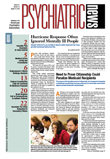Resilience rather than pathology should become the standard expectation in the aftermath of trauma, according to a leading researcher on posttraumatic stress.
“PTSD may not be the best model in the face of disaster,” Arieh Shalev, M.D., professor and head of the Department of Psychiatry at Hadassah University Hospital in Jerusalem, Israel, said at a conference on early response to PTSD at the New York Medical College in Valhalla, N.Y. “The preferential use of PTSD emphasizes the psychopathological consequences of events. This has led to costly and ineffectual efforts toward systematic prevention of PTSD, with less attention or resources devoted to other outcomes.”
A traumatic event alone is not a sufficient cause of PTSD, and PTSD is not the most frequent response to traumatic events, said Shalev. Studies after the terrorist attacks of September 11, 2001, found a limited prevalence of PTSD after six months.
“We need to define and study the non-PTSD outcome,” said Shalev. To him, that means exploring the meaning and utility of resilience.
Psychological resilience means the ability to “bounce back,” to adapt and function in the face of serious threat or adversity, much the way an engineer observes the ability of some material to return to is original shape after deformation, he said.
“We've gone from nonrecognition to overrecognition of PTSD,” said Matthew Friedman, M.D., Ph.D., executive director of the National Center for PTSD in White River Junction, Vt.
Friedman said he could remember when the struggle was to persuade the psychiatric community and the public to understand that PTSD sometimes happens to people who were in the wrong place at the wrong time. But this idea may have become oversimplified with time. Today, although a significant minority of people exposed to war or disaster develop PTSD, there may be other psychiatric sequelae to trauma—or nothing at all may happen to the person involved, he said.
“Eventually people came to see trauma only through the lens of PTSD, and that was not good either,” said Friedman. “The response to trauma is not an either-or thing. Trauma can cause psychiatric illness but also can also be a crucible that brings out the best in people.”
Resilience should be the default unless other circumstances prevent it, said Shalev. Outcomes are affected by an array of risk factors (like neglect, abuse, lower socioeconomic status, or poor education) and protective factors (social support, escape, or control). The response to trauma may have multiple contributing causes and take many routes to an outcome, and similar inputs may lead to diverse results.
Rather than automatically pathologize the response to trauma, Shalev suggested that good adaptation should be considered the norm.
“Resilience is common and usually arises from the normative functions of human adaptational systems, with the greatest threats to human development being those that compromise these protective systems,” he said, quoting ann Masten, Ph.D., of the institute of Child Development at the University of Minnesota.
“A bad outcome occurs when adaptive processes cannot take place,” said Shalev. Exposure to trauma has different phases, he said. The initial event sparks an acute stress response and a focus on survival. The rescue phase marks an adjustment to the reality of the event, while the immediate postevent period calls for an appraisal of the event. The final stage involves the attempt to return to normal activities, with greater or lesser difficulty.
Preventive measures, then, are mainly concerned with overcoming barriers to normal adaptation. Dramatizing, pathologizing, or catastrophizing the traumatic event can undermine resilience from the start, as can creating negative expectations about outcome, hiding or manipulating information, and showing emotional distance or indifference to those who have experienced trauma. Adaptation can occur by simply allowing stage-related processes to proceed while not undermining resilience, said Shalev.
“We need to understand what are the qualities—genetic, molecular, cognitive, social—that help people cope,” agreed Friedman. “Shalev's views exemplify where the field has gone in the last five years. Since September 11, the focus has turned to understanding people who cope successfully. We have to think about the aftermath of trauma exposure in two contexts: We still need to recognize that some people will not recover on their own. However, we also have to ask: What makes resilience? What are the protective factors that allow people to cope, that prevent the onset of PTSD, and facilitate or even accelerate recovery?” ▪
